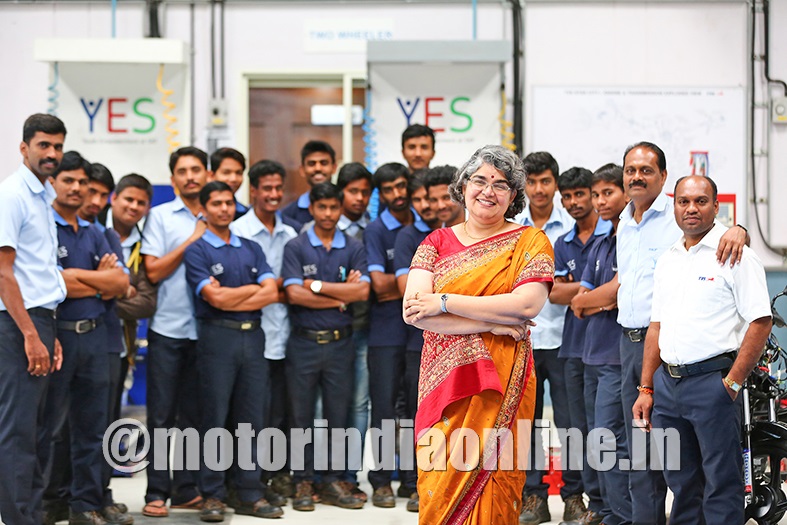It is time to turn the spotlight onto the largely ‘invisible in plain vision and voiceless’ workforce that works tediously behind the scenes with no acknowledgement, respect or sometimes basic amenities. Yet all countries including India, run on the efforts of this working section of the community.
LabourNet was started in 2007 with a unique insight into the lives of these blue-collar workers that ‘Livelihood is not an industry’. Registered as a company a year later, LabourNet started with migrant workers in the construction sector.

Ms. V. Gayathri, CEO, says: “The problem today is under employment, and the lack of social acceptability and respectability of the jobs. Lack of skilling is the main issue, but who wants to do the skilling? And who finds it inspirational to become an auto service mechanic or a truck driver? The answer is – no one.”
Hence, LabourNet is seeking a change in the society’s mindset towards vocations.
She further says: “LabourNet is about enabling work to workers most of whom are underprivileged. But they too can be provided with opportunities to earn a good living. But we need to know how good or average are they in their work. Hence came the step of training and certifying them. Working with construction equipment operators led us into the realm of heavy equipment, then into the rubber industry and then as a natural segue, we moved into the automotive sector as well.”
The 3 Es
LabourNet follows the concept of three Es – Education in vocational programs, Employment and Entrepreneurship. Today, LabourNet has 2,000 staff members of whom 1,200 are trainers.
Ms. Gayathri explains: “We believe that vocational education must have a necessary outcome in the form of employment and entrepreneurship. We run 2-3-month training programs in partnership with various corporates. It is the school dropouts who come in for the full-time training which is given in auto servicing, painting and denting courses.”
The First E – Education
LabourNet conducts courses under the automotive segment for tractors, two-three-four-wheeler vehicles, but most importantly teaches safe driving of commercial buses.
Ms. Gayathri shares: “For commercial vehicles, there are two elements – one is service and the other is safe driving. We realised we needed to re-skill the drivers since the buses now have advanced technology. We took up a project with the Himachal Pradesh STU to re-skill their drivers and sought customer feedback to rate their driving skills. When we played back the recordings to the drivers they realised that the customers were saying good things about their driving. It created a feeling of pride and they realised that when they followed all the rules they got positive feedback.”
LabourNet runs short certification programs, including for the experienced ones called RPL programs or Recognition of Prior Learning programs. Says Ms. Gayathri: “We certify roughly 3,000 truck drivers per annum under the 12-hour program which is called the RPL bridge.”
As for the next E – Employment, LabourNet manages the services where the candidates are put on their company payroll, and as Ms. Gayathri explains: “We do their payroll and compliance. LabourNet has become the contractor in addition to having a trainer because we believe that if their capability is built, they will earn better.”
Now about the final E – Entrepreneurship. These are the times for micro entrepreneurs who have less than Rs. 10 lakhs as seed investment, to earn well, especially in the automotive sector. Ms. Gayathri adds: “But these are also the people who have no support system. So LabourNet helps them set up their business, build it up by giving more training so that their productivity is higher. We help them with forward and backward linkage, help with finance, compliance and legal services. Ultimately we impress upon them that we want them to make money.”
The whole concept gets looped back to LabourNet’s motto – enabling livelihood. And Ms. Gayathri and her team make utmost efforts to ensure that the entrepreneurs understand that capacity building is the key.
Edu-training at school level
LabourNet’s school skilling program is part of Rashtriya Madhyamik Shiksha Abhiyan (RMSA), and it is called the National Vocational Education Qualification Framework (NVEQF). The program that was initiated in 2013 is imparted daily for about 40 minutes for a period of four years.
Ms. Gayathri explains: “With changing technology, life is becoming more inter-connected, but the challenge is how can it be imparted to the poor or the underprivileged. As a step forward, we are integrating skills in schools from standards 9-12 where the students can opt for a vocational subject instead of a third language.”
LabourNet which has received Government approval is associated with about 700 government schools in the northern and eastern India to impart skill and training at the school level.
She says: “Currently, we conduct courses in construction, agriculture, beauty, apparel and healthcare, among a few others. As per our knowledge, about 30 per cent have taken up jobs while the remaining have opted for graduation.”
In her own words, LabourNet is in talks with popular private schools to run the program because ‘brands have to pick it up’ for creating better awareness and in turn better acceptance for vocational skills across the society.
Challenges galore
Being a highly informal sector, automotive offers extremes to deal with, for a company like LabourNet. At one end is the high mechanization while at the other end is the ‘extreme informality’. Fortunately, it is one sector that is growing rapidly with newer avenues opening up in the form of alternate mobility and compliance to emission norms.
Ms. Gayathri agrees: “A micro entrepreneur can easily encash it to his/her advantage. Yet the eco-system is not built for it. So LabourNet tries to rise above this challenge by adopting the characteristics of a formal sector so that we are able to make a difference to people.”

Another major challenge that Ms. Gayathri acknowledges is that of skilling the value chain. She shares: “How does one skill the value chain? Everybody is thinking of their own employees. For example, a service technician or a bus driver belongs to some other company, or take a truck driver who may be a single truck owner – these are the people who need enormous attention and skilling. But for this to happen, our mindset needs to change and we need to think of them as earners because they are productive and they contribute to our GDP. That very fact indicates that they deserve respect and attention.”
Her efforts have started bearing fruit. At least 150 clients of LabourNet in the auto industry have accepted it, she says.
Fruits of labour
According to Ms. Gayathri, there are various measures of success. Her company certifies roughly 2.5 lakh people annually and is one of the few to have gone beyond hundred crores in revenue. She shares: “We have created footprints across India and we have managed to highlight the informal sector as a potential market that the corporates must consider.”
Another yardstick for success for Ms. Gayathri is where professionals from multinational companies have started believing in her efforts and are joining her.
LabourNet is no more a small start-up but is on its way to creating an industry.